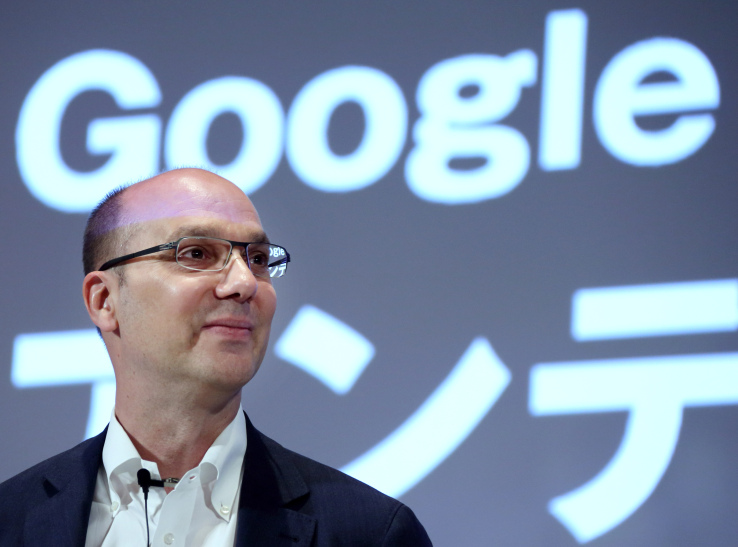

Andy Rubin, the creator of Android — arguably the widest distributed operating system in the world — left Google a few years back to start a hardware incubator with a $300 million fund called Playground.
Since then, he’s been pretty busy trying to envision the future of hardware. And that doesn’t just include robotics. At the Bloomberg technology conference he showed off two pieces of hardware: a transponder for drones and a backpack that basically provides haptic feedback alongside music. Both of them represent some kind of new, novel way that the real world can interact with the internet and data — and that’s where Rubin thinks the next big bets in technology should happen.
“I think the new opportunity is to bring that data from offline sources, not the cloud,” Rubin said at the Bloomberg technology conference. “That’s where robotics comes in. Robots are walking, mobile sensors that can sense their environment, interact, and learn from those interactions. In computer science we call that sense, plan, act. The act part, from a historical perspective, if you were doing stuff in the cloud you were trapped in the cloud. If you can’t interact with the real world you’re stuck in a jar. The robotics is the act part, once you sense and plan you can send it back into the real world.”
At Playground, Rubin and his team — a bench of around 15 engineers that are experts in fields like computer science and mechanical engineering — are incubating around 15 companies, Rubin said. The way it works is that companies that are basically envisioning new ways of how computing can interact with the real world come up, they’re given the resources — and financing — figure it out and then head off into the real world.
The applications of what Rubin and his team are working on aren’t necessarily in hardware. Rubin mentioned that he’s also incubating a quantum computing company that he wouldn’t name. But even then that is a play on rethinking the underlying architecture behind computing that will figure out how to take AI applications to a new level — while still using the standard manufacturing processes, he said.
“When the opportunity comes, this is like aligning the stars,” Rubin said. When everything is perfectly aligned boom, you should start it.
Speaking of quantum computing: While he spent a lot of time talking about how AI could become a new foundational layer of the internet, he said that we shouldn’t be worried about AI turning around and taking over the world. At least, not yet. The ability to do high-level pattern matching at an extremely efficient level is what AI is good at, but it’s not good enough to apply expertise in one domain to other domains, he said.
“What AI is good at is pattern matching, that’s what quantum computing is good at,” Rubin said. “Those two things combined in hundreds of years might get us to a point of this conundrum of who is the master and who is the servant. If you think just about quantum computing without AI and how that type of architecture could eliminate all known forms of encryption, you have different problems. You shouldn’t worry about Skynet coming online, you should worry about what does it mean to compute at the magnitude of [quantum computing].”
Rubin and Playground aren’t just making bets on inbound interest, or companies that are already out there, either. He said that there are plenty of opportunities to “hatch” new companies within the company using its resources of engineers. And he — the founder of Android — said he still isn’t quite done with the smartphone space.
“Remember, the thing that really keeps me going and gets me awake is when a new product is created that many people use,” Rubin said. “One thing playground does well is we have the bench of engineers, a lot of capital to invest, we act as a traditional Venture Capital firm. We wait for people to come through the door, like the quantum computing company, and say yes we’ll invest in that. Every now and then we’ll do our pattern matching. We’ll notice that someone isn’t walking in the door. So we the notion of hatching companies out of Playground using the resources that are the bench of engineers, funding it and setting it free. I do have one actively being hatched in the mobile space.”
Featured Image: Tomohiro Ohsumi/Getty Images

